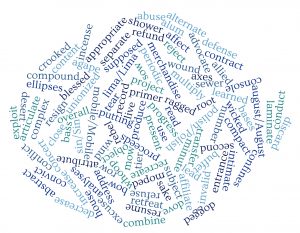Have you ever looked at a word, pronounced it in your head, and then not know what everyone else is talking about? You are probably suffering from Emphasis on the Wrong Syllable syndrome (pronounced Em-Fā-Siss on the Wrong Sa-Lab-El).
My best personal example is Appomattox. I walked into US History class one day and that word was on the chalkboard (yes, we had chalkboards in those days). In my head, I said it quite wrong: A-Pot-O-Mox. So, when my teacher started talking about the famed Appomattox (Ap-Ō-Matt-Ax) Court House where Lee surrendered to Grant, I was a bit confused.
| SIDE NOTE: I don’t remember anyone even trying to teach me how to understand/work with pronunciation break downs (or what it’s even officially called), so you’ll have to deal with my version. |
English is Weird
So, that’s an example of just getting a word wrong. However, English is weird. There are words you can get wrong even when you’re getting them right! In fact, “right” is a prime example. If something is correct, it is right. If something is not to the left, it is to the right. You write text. We’ve got three meanings, two spellings, and one pronunciation. All of them are homophones. Right and right are homonyms while right and write is an example of heterographs.

Then you have the heteronym: one spelling, different pronunciations and meanings. My favorite example is lead. If you lead (long e sound) the pack, you are ahead of everyone else. Or, you have number 82 on the periodical table: lead (not a long e sound). If you want to give yourself fits, check out the Wikipedia page for Heteronym. There are lots of examples in English, French, Modern Greek, and Italian. (Yes, Modern Greek.)
Finally, there’s read. Who thought that spelling the past tense and present tense of a verb the same way but pronouncing them differently was a good idea?!
Words People Get Wrong
I used to have an issue with hear, here, there, and where. Eva in 7th grade English class saved me. You HEAR with your EAR and HERE is part of location words.
OK, now for the frequently memed words. Here’s a handy reference table:
|
to |
Indicates motion or direction |
|
too |
Also or more than is needed |
|
two |
2 |
|
there |
Not here |
|
their |
Technically, indicates the possession of a group. Informally, indicates the possession of a person of undesignated gender. |
|
they’re |
They are. |
|
your |
Something that belongs to you. |
|
you’re |
You are. |
These words can create great annoyance among readers when improperly used. Oddly enough, of all my word foibles, these are not at the top of the list.
And thus ends our grammar lesson for the day. I’m sorry to Mrs. Zimmerman and Mrs. Fuller who taught me better than I learned.
-Lorrie Nicoles